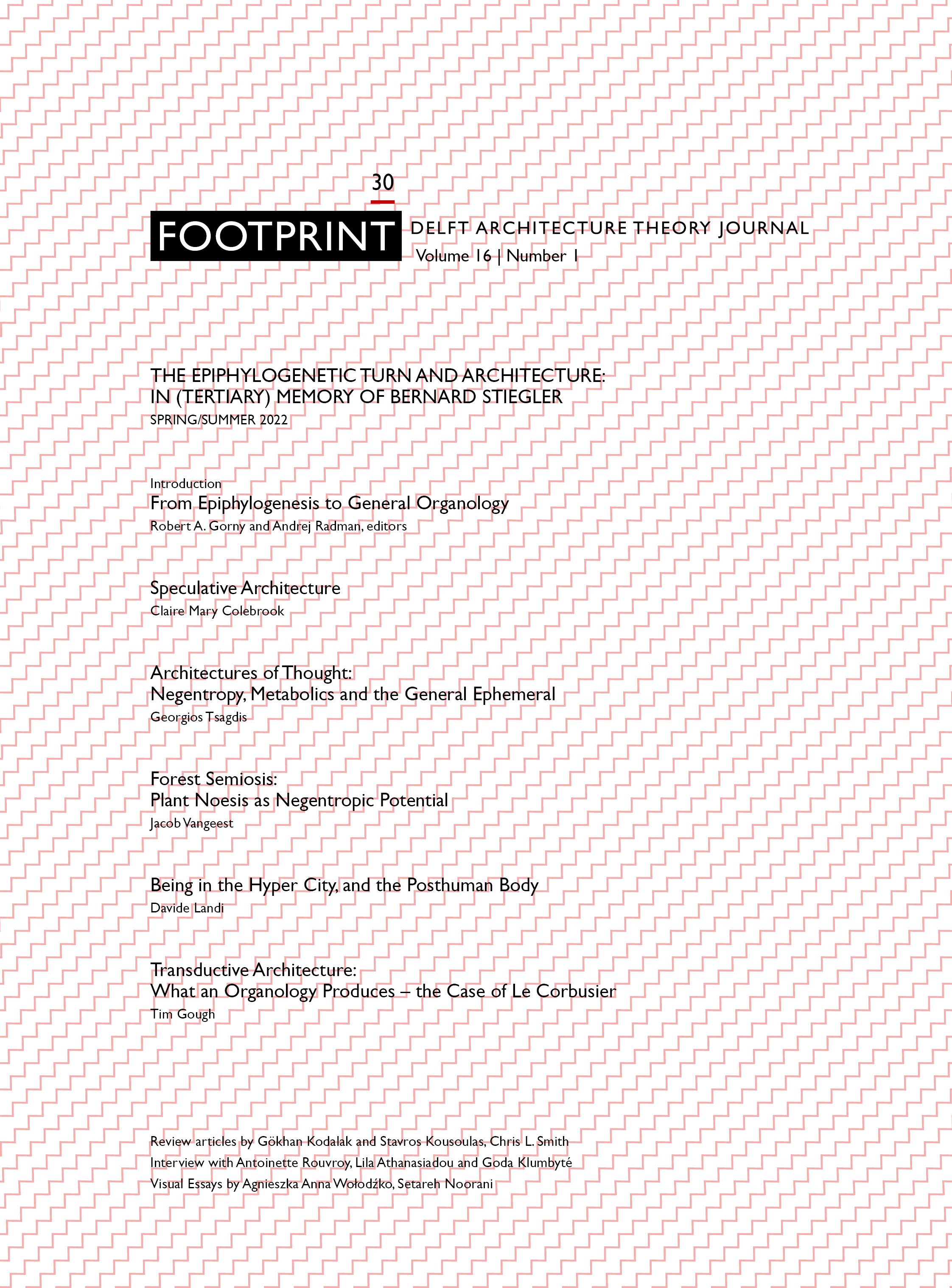Speculative Architecture
DOI:
https://doi.org/10.7480/footprint.16.1.6240Abstract
What is the problem of epiphylogenesis? We can define and understand the term, but what does it do and what does it demand of us? Indeed, one way of thinking about epiphylogenesis is through Bernard Stiegler’s claim that some forms of technology generate or enable long circuits of desire, and that this needs to be recalled in a time of short-circuits. Epiphylogenesis requires both that we pose problems differently, and that ‘we’ are, or should be, a problem to ourselves. Let me unpack this by beginning with what presents itself as a major problem: climate change, and the end of the world. What are we going to do? How can we change course? How do we save the world? The posing of the question in this way is only possible if there is a distinct ‘we’ who must then deliberate a course of action in relation to the world. Epiphylogenesis shifts the question towards the very possibility of this ‘we.’ How do formations of what comes to think of itself as ‘the human’ come into being, and what worlds and capacities do such formations make possible? For Stiegler the problem of climate change is ultimately the problem of who ‘we’ are, along with a constitutive tendency towards the failure to confront this question.
References
Butler, Octavia, Dawn (New York: Warner Books, 1987).
Césaire, Aimé, Return to My Native Land (Brooklyn, NY: Archipelago Books, 2013),
Deleuze, Gilles and Félix Guattari, Anti-Oedipus, trans. Robert Hurley, Mark Seem and Helen R. Lane (New York, NY: Penguin, 2008).
Derrida, Jacques, Archive Fever: A Freudian Impression, trans. Eric Prenowitz (Chicago: University of Chicago Press, 1996).
Derrida, Jacques, Limited Inc. (Chicago: Northwestern University Press, 1988).
Graeber, David, ‘Radical alterity is just another way of saying “reality”: A reply to Eduardo Viveiros de Castro’, Hau: Journal of Ethnographic Theory 5.2 (2015): 1–41.
Heidegger, Martin, Being and Time, trans. Joan Stambaugh (Albany, New York: SUNY Press, 1996).
Husserl, Edmund, Ideas Pertaining to a Pure Phenomenology and to a Phenomenological Philosophy: First book, General Introduction to a Pure Phenomenology, trans. Frederick Kersten (Dordrecht/Boston/London: Kluwer, 1982).
Jemisin, N.K., The Fifth Season (New York: Hachette, 2015).
Sharpe, Christina, In the Wake: On Blackness and Being (Durham: Duke University Press, 2016).
Sharpe, Christina, Monstrous Intimacies: Making Post-Slavery Subjects (Durham: Duke University Press, 2010).
Solomon, Rivers, An Unkindness of Ghosts (Brooklyn: Akashic Books, 2017).
Steigler, Bernard ‘The Proletarianization of Sensibility’, Lana Turner Journal 4 (2012), <http://www.lanaturnerjournal.com/archives/prolsensestiegler [accessed 25 December 2014].
Stiegler, Bernard, Automatic Society: Volume 1 The Future of Work, trans. Daniel Ross (Cambridge, Polity Press, 2016).
Stiegler, Bernard, Technics and Time 4: Faculties and Functions of Noesis in the Post-Truth Age, trans. Daniel Ross. (2021), 130–131, <https://www.academia.edu/58785373/Stiegler_Technics_and_Time_4_Faculties_and_Functions_of_Noesis_in_the_Post_Truth_Age> [accessed 16 December 2021].
Stiegler, Bernard, The Decadence of Industrial Democracies: Disbelief and Discredit, Volume 1, trans. Daniel Ross and Suzanne Arnold (Cambridge: Polity Press, 2011), 13.
Viveiros de Castro, Eduardo, ‘Cosmological Deixis and Amerindian Perspectivism’, Journal of the Royal Anthropological Institute 4, no. 3 (1998): 469–88.
Warren, Calvin L., Ontological Terror: Blackness, Nihilism, and Emancipation (Durham: Duke University Press, 2018).
Wilderson, Frank B. III, Afropessimism (New York: Liveright, 2020).
Downloads
Published
Issue
Section
License
Copyright (c) 2022 Claire Mary Colebrook

This work is licensed under a Creative Commons Attribution 4.0 International License.
- Authors retain copyright and grant the journal right of first publication with the work simultaneously licensed under a Creative Commons Attribution License that allows others to share the work with an acknowledgement of the work's authorship and initial publication in this journal.
- Authors are able to enter into separate, additional contractual arrangements for the non-exclusive distribution of the journal's published version of the work (e.g., post it to an institutional repository or publish it in a book), with an acknowledgement of its initial publication in this journal.





